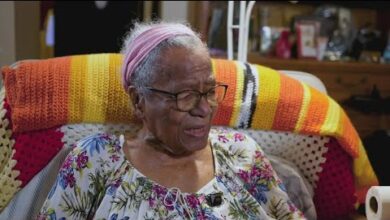Concerns continue over attacks on Gaza health workers

Nursing leaders have demanded an end to “barbaric” attacks on clinicians in Gaza, and other conflict zones, as hundreds of healthcare workers have reportedly died in targeted strikes on healthcare facilities.
Tens of thousands of people have been killed in the Gaza Strip since a long-standing conflict resumed in the Palestinian region last autumn.
“Nurses should not be expected to put their lives at risk”
Pamela Cipriano
The Israel Defense Forces (IDF) began its invasion of Gaza following an attack on Israeli territory on 7 October 2023 by Palestinian military group Hamas.
Since then, the World Health Organisation (WHO) reported there had been 492 attacks on healthcare infrastructure in Gaza, killing 747 people, as well as a further 512 healthcare-related attacks in the West Bank, a separate Palestinian territory.
Healthcare workers themselves, according to international observers, have been among those killed.
Meanwhile, conflicts in other parts of the Middle East, Ukraine and elsewhere continue to rage with healthcare workers similarly caught up – and killed – in the fighting.
A letter demanding a ceasefire between the Israel Defence Forces (IDF) and Hamas has now been published by the Gaza Health Initiative, a group formed of international health groups set up to help rebuild Palestinian medical infrastructure.
Gaza Health Initiative members, which co-signed the letter, include the British Arab Nursing and Midwifery Association (BANMA), Doctors Worldwide, Doctors Against Genocide, Jewish Voices For Peace, the British Egyptian Medical Association and more than a dozen others.
According to the letter, which criticised world leaders for inaction on stopping the conflict, at least 500 Palestinian healthcare workers have now been killed since the conflict resumed in October, with “numerous” more abducted and injured.
The total death toll in Gaza, according to the latest WHO figures, stands at 39,090, as of 22 July 2024.
A ceasefire, the group said, was needed immediately as the health infrastructure of the region continued to be devastated by the Israeli invasion.
“We demand international protection of Gaza’s civilian healthcare (hospitals and primary healthcare) as well as of the healthcare worker staff in Gaza,” the letter read.
“We also note that the backbone of healthcare during this unimaginably dramatic, man-made health crisis has been delivered by the local Palestinian healthcare workers of all types and specialities.”
The Gaza Health Initiative referred to WHO reports that the South Western region of Rafah, which Israel began attacking in mid-May, now had no functioning hospitals.
According to WHO, the entire Gaza Strip – which still holds more than a million people – has only 16 “partially functional” hospitals, of which 11 are only “partially accessible”.
The 16 hospitals across Gaza, WHO said, together have a bed capacity of just 1,400. As of 22 July, there were 48 functional primary healthcare facilities across the region.
Further, WHO reported outbreaks of diseases including poliovirus, scabies, lice, acute jaundice syndrome and respiratory infections.
WHO described the situation as a “dismantling” of the health system in Palestine.

Ofrah Muflahi
Ofrah Muflahi, registered nurse and founder of BANMA, told Nursing Times: “For the last 10 months, we have watched the atrocities on our screens.
“Many BANMA members have families who have either been killed or suffering in Gaza with no food, water, healthcare or bare essentials to survive in addition to the showering of bombs.
“BANMA supports this joint statement seen through a humanitarian lens and we hope, as nurses, there is an end to this conflict very soon.”
The International Council of Nurses (RCN), this week, also issued a public statement calling for “firm and decisive action” to prevent attacks on nurses and health infrastructure in warzones across the world, including Gaza.
The ICN has, over the last year, repeatedly made such calls and has warned that healthcare workers being targeted by militaries has become “normalised”.
Dr Pamela Cipriano, ICN president, wrote to United Nations secretary general António Guterres to call on the organisation to do “everything” in its power to protect nurses.
“I am asking you to use the powers of your office to express again your condemnation of the barbaric attacks we have seen around the world,” Dr Cipriano said.
“Restate the protections that nurses and other healthcare workers should be afforded under international law.
“No one engaged in humanitarian work should fear for their safety or their lives.”

Pamela Cipriano
Dr Cipriano said a recent United Nations resolution proposing a “three-phase” ceasefire in Gaza was “welcome” but that there was an “urgent and growing need” to improve humanitarian aid to the region and to help Palestinians access healthcare.
She continued: “Nurses’ commitment to the wellbeing of others is unwavering, despite lack of resources and often being under-valued and under-paid.
“They should not, however, be expected to put their lives at risk.
“ICN has extended support to nurses working in both Israel and Palestine, and we are deeply concerned about the ongoing death and destruction that persist daily in that region.”
According to ICN, attacks on nurses have happened in Ukraine, Palestine, Israel, Sudan, Afghanistan, Myanmar and other conflict zones in the last year alone.







